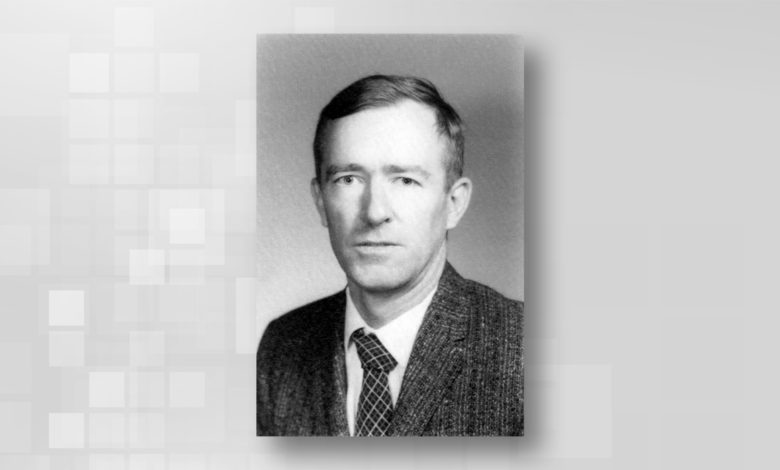
Like other engineering societies, IEEE has a History Committee, but how did it come to have a History Center, staffed by professional historians? James E. “Jim” Brittain, a soft-spoken electrical engineering professor at Georgia Institute of Technology who died in March 2018, was largely responsible. Why some people have the “history bug” is a mystery, but one imagines that his upbringing fed his remarkable and successful advocacy for what he called “the increase and diffusion of knowledge about the contributions of electrical engineers.”
Born on his parents’ farm in the foothills of western North Carolina, Brittain grew up during the Great Depression of the 1930s without electricity or an indoor toilet. The local grain mill was water-powered, and the family traveled locally on dirt roads by foot or horse and wagon. Until he started traveling to the local public school by bus in 1937, Brittain and his family lived a pre-industrial existence in many respects. When he graduated at the head of his class of 26 students twelve years later, no one could tell him about financing options for college. Instead, after a summer laboring on a farm, he joined the U.S. Air Force. Testing revealed aptitudes for electronics and, after basic training, Brittain became a student and then instructor of radar technology during the Korean War at the age of 19. His mastery of the circuitry and operation of the APN-9, APQ-13, and APG-15 radars, and then APR-8 and APT-16 electronic counter measure units, among many others, led to pursuit of an electrical engineering (EE) degree at Clemson College in South Carolina, a EE master’s degree at the University of Tennessee, and a return to Clemson as an instructor.
During the 1960s, he began adding historical asides in his EE classes and writing short historical articles. These activities culminated in his decision to pursue a Ph.D. at Case Institute of Technology in Cleveland, not in electrical engineering, but in the new field of the history of technology. In 1969, with his Ph.D. dissertation on “B. A. Behrend and the Beginnings of Electrical Engineering” in hand, Brittain accepted an assistant professorship in the history of science and technology at the Georgia Institute of Technology.
During his graduate studies, Brittain had engaged with members of the IEEE History Committee. This led to his first appointment thereon in 1972, with service continuing for an unprecedented seven years. At the time, the Committee’s efforts were episodic and focused on oral histories. Brittain’s letter to IEEE Spectrum, “Engineers Awake!,” in May 1973 included the first proposal for a center for the history of engineering that would match the activities of the scientific professions’ history organizations. Working with Frederick Terman, Jack Ryder, Bernard Finn, Donald Christiansen, Reed Crone, Michael Wolff, Robert Lucky, and many others, Brittain concentrated interest in and support for a professionally run center that would undertake activities like a newsletter, a landmark program, publication prizes, publications, oral histories, an IEEE archive, bibliographies, and catalogs of artifacts. Introduced by vice-president Lucky at the December 1978 IEEE Board meeting, Brittain set out the need to identify, preserve, and disseminate materials and histories related to IEEE and its members, and proposed the progressive development of a history center that would operate full-time by AIEE-IEEE centenary in 1984. The Board responded by voting to allot $25,000 as the first appropriation for the “Establishment of a Center of the History of Electrical Engineering.” Nine months later, it accepted a review committee’s recommendations for a history center along the lines that Brittain had proposed.
Robert Friedel became the first director in 1980. Today the IEEE History Center, under Eric Herz Award winner Michael Geselowitz and the History Committee, has a staff of six preserving and cataloging the IEEE Archives; administering the IEEE Milestones program and preparing the Newsletter; maintaining and expanding the Engineering and Technology History Wiki; conducting and editing oral histories; editing and writing “Scanning Our Past” articles for Proceedings of the IEEE; designing exhibits and organizing conferences; and developing and promoting high school inquiry units in the history of technology through the REACH program. Looking back at what he had started, Brittain wrote in 2012 that the IEEE History Center’s “success has exceeded my most sanguine expectations.”
Brittain’s contributions to the preservation of the history of his field extended well beyond the History Center. In 1977, he researched and wrote the study that successfully endorsed the scholarly edition of Thomas Edison’s papers, which, he wrote, “promised to become the most important documentary project yet undertaken in the field of American technological history.” Initiated in 1978, the Edison Papers project has resulted in eight prize-winning volumes of documents from Edison’s labs, and 500,000 microfilmed and digitized pages between 1850 and 1919. Since 1997, the Project has built a steadily expanding website that will become the future platform for the edited papers as well.
In addition, over nearly sixty years, Brittain published 398 articles, including hundreds for Proceedings of the IEEE. There he initiated the monthly “Scanning Our Past” section and served as a member of the editorial board for 27 years, until 2017. Brittain chaired the IEEE History Committee twice, and in 1987 the IEEE elected him a Fellow “for the development of the field of electrical history.” He became a professor emeritus in 1994 and Life Fellow in 1995, after writing four books and encouraging thousands of people at Georgia Tech and around the world to account for the social, political, economic, and cultural contexts that shape and interact with humanity’s developments in engineering, technology, and science. Rest in peace.






